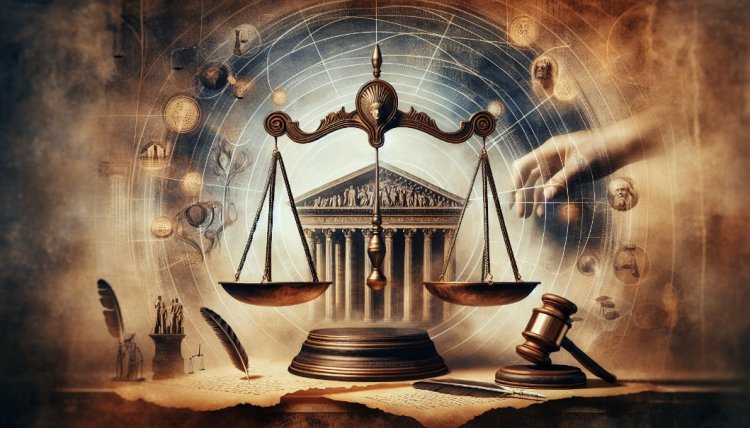Occult World of Business and Finance, Chapter 3
Explore the "Occult World of Business and Finance" in all its richness. By delving into the obscure ties between the occult and the financial sector, this article elucidates how esoteric and magical activities impact contemporary economic and corporate tactics.

Uncovering the Corruption: The Hidden Truth about the Court System
The court system plays a vital role in our society, ensuring justice and maintaining order. It is a complex system that is deeply intertwined with various institutions and organizations, including the Bar Association. In this section, we will explore the connection between the court system and the Bar Association, as well as delve into the influence of the Ordo Templi on the Bar Association.
Understanding the Court System and the Bar Association
The court system is responsible for interpreting and applying the law. It consists of different levels, such as local, city, county, and state courts. One key player in the court system is the Bar Association, which is composed of lawyers who are licensed to practice law. The Bar Association plays a crucial role in regulating the legal profession and upholding ethical standards among attorneys.
The Influence of Ordo Templi on the Bar Association
The Ordo Templi is an ancient Templar organization that has a significant influence on the Bar Association. The connection between the two can be traced back to the temple bar, which is located at the end of the court. It is believed that the Ordo Templi issued a contract known as a letter patent, which directs all bar associations on the planet. This contract is based on the principles and practices of the Knights Templar, who played a significant role in shaping our modern banking system.
Becoming a Ward of the Court
When hiring an attorney, one becomes a ward of the court. Although this may sound alarming, it simply means that the court recognizes the attorney-client relationship and the attorney's obligation to the court. However, it is interesting to note that the legal definition of a ward of the court refers to infants or persons of unsound mind. So, in a way, hiring an attorney places you under the legal protection and guidance of the court.
The Connection Between Attorneys and Judges
Attorneys and judges have a close relationship within the court system. Attorneys advocate for their clients' interests and present their cases before judges, who ultimately make decisions based on the law. It is important to note that judges and attorneys may have professional connections, such as belonging to the same bar association, which reinforces the interdependence of these roles in the court system.
Ancient Esoteric Principles in the Court System
The court system relies on ancient esoteric principles that have influenced its structure and practices. These principles view the body as an energy vessel and the court system as a reflection of ancient Phoenician commercial law. The concept of admiralty law, which is based on maritime jurisdiction, is used to assert authority in the court system. Additionally, the court's reliance on paper certificates and the use of Federal Reserve Notes reflect the system's connection to ancient esoteric principles and the modern monetary system.
Understanding the Court System
The court system can be complex and confusing for many people. To gain a better understanding of this system, it is important to explore some key aspects of it. This section will focus on the role of bail, discharging debts, the commercial aspects of the court system, the concept of justice versus business, and the influence of monetary systems.
Role of Bail and Its Significance in the Court System
Bail plays a crucial role in the court system. It allows individuals who have been arrested and are awaiting trial to be released from custody, provided they can meet certain conditions set by the court. The purpose of bail is to ensure that defendants appear for their scheduled court appearances. By allowing individuals to be released from custody, bail preserves their presumption of innocence until proven guilty.
Discharging Debts and Paying One's Debt to Society
In the court system, discharging debts refers to the process of fulfilling one's obligations to society as a result of committing a crime. This can involve paying fines, restitution, or serving a sentence in jail or prison. By discharging their debts, individuals are considered to have paid their debt to society, and they are allowed to reintegrate into the community.
Commercial Aspects of the Court System
The court system has commercial aspects that are often overlooked. From the issuance of letters patent by the ancient Templar organization, Ordo Templi, to the influence of the Bar Association on the court system, commercial interests can be intertwined with legal proceedings. This connection highlights the commercial nature of the court system and its connections to the modern banking system.
Justice versus Business in Court Proceedings
One of the key debates surrounding the court system is the balance between justice and business. While the court system is intended to uphold justice and ensure fair outcomes, there are instances where commercial interests may take precedence. This tension between justice and business can raise questions about the fairness and integrity of court proceedings.
Influence of Monetary Systems on the Court System
Monetary systems have a significant influence on the court system. The use of Federal Reserve Notes, the reliance on paper certificates, and the financing of court buildings through anonymous bonds all demonstrate the connection between the court system and monetary systems. Understanding this influence can shed light on the complex relationship between law, commerce, and finance.
Exposing the Financial Manipulation
In this section, we will delve into the hidden financial manipulations within the court system. Marvin Breyer, an ex-Bank of America employee and Cobalt programmer, made some startling discoveries about the misappropriation of funds in the court system. By tracking the money paid to the court and conducting extensive research, Breyer found that the funds were being diverted into private accounts instead of being allocated as mandated by the legislature.
Funds Misappropriation
The money paid to the court, whether in the form of fines, fees, or restitution, is supposed to be used for the proper administration of justice. However, Breyer's investigations revealed that the funds were going into different accounts associated with the Judges Association, instead of being used for their intended purpose. This raises serious questions about the transparency and accountability of the court system.
Anonymous Bonds and the Federal Reserve
One of the key revelations made by Breyer is the role of anonymous bonds in financing the court system. These bonds, primarily underwritten by Merrill Lynch and associated with Bank of America, are used to raise debt without taxpayer approval. The Department of Deposit Trust Corporation (DTC), controlled by Federal Reserve board members, oversees these bonds. This connection between the court system and the Federal Reserve raises concerns about the independence and impartiality of the judiciary.
Credit Ratings and Court Activities
The credit ratings of the anonymous bonds are directly linked to the performance of the court system. The ability of the courts to arrest, prosecute, and convict individuals in civil matters has a direct impact on the credit ratings of these bonds. This implies that the financial well-being of the court system is dependent on its ability to generate revenue through fines, fees, and restitution, creating a potential conflict of interest.
The Perpetual Cycle of Debt and Courthouse Construction
The financing of courthouse construction further perpetuates the cycle of debt within the court system. The bonds raised through Merrill Lynch and other associations are used to finance the payments to contractors for building more courthouses. This perpetual cycle of debt creates a financial burden that ultimately falls on the taxpayers. It raises questions about the prioritization of resource allocation within the court system.
Marvin Breyer's discoveries shed light on the hidden financial manipulation within the court system. By exposing the misappropriation of funds, the connection to anonymous bonds and the Federal Reserve, the dependence on-court activities for credit ratings, and the perpetual cycle of debt, Breyer highlights the need for greater transparency and accountability within the court system. Understanding these financial manipulations is crucial to ensuring a fair and just legal system for all.
Uncovering Conflict of Interest
Conflict of interest is a common issue in the court system, where judges may have personal or financial interests that could interfere with their impartiality and fairness. These conflicts can be revealed through Public Records Act requests, which allow individuals to obtain information about the financial activities of judges and the court system.
Marvin Breyer, an ex-Bank of America employee and Cobalt programmer, has developed strategies for exposing conflicts of interest within the court system. By tracking the money paid to the court and conducting extensive research, Breyer has uncovered the misappropriation of funds. He found that the funds paid to the court were being diverted into private accounts associated with the Judges Association instead of being used for their intended purpose of the proper administration of justice. Through his investigations, Breyer has exposed the lack of transparency and accountability within the court system.
The consequences for judges with conflicts of interest can be severe. Breyer's findings have led to judges being thrown in jail and prosecuting attorneys being disqualified. When conflicts of interest are exposed, court cases can be reversed based on a violation of impartiality. Judges can face legal repercussions, and their decisions may be invalidated. This highlights the importance of impartiality and the serious consequences that can result from conflicts of interest.
Conflicts of interest have a significant impact on court cases. When judges have conflicts, it raises questions about the fairness and integrity of court proceedings. The connection between judges and attorneys, such as belonging to the same bar association, can reinforce these conflicts and further compromise the impartiality of the court system. Conflicts of interest can undermine trust and confidence in the court system and have a detrimental effect on the outcomes of cases.
The exposure of conflicts of interest can lead to potential reversals of court cases. When conflicts are identified, it provides grounds for individuals to file complaints and seek the reversal of their cases. The courts may reconsider their decisions and take action to rectify the injustices caused by conflicts of interest. Reversals of cases based on conflicts of interest serve as a reminder of the importance of fairness and impartiality in the court system.
Law as a Tool for Justice
Law, at its core, is an agreement among individuals based on natural law principles. It serves as a tool for justice, ensuring that fairness, equality, and order are maintained within a society. However, the court system, which is responsible for interpreting and applying the law, is not without its weaknesses.
The court system, composed of various levels and institutions, is complex and can be prone to inherent flaws. One of these weaknesses lies in the potential for financial misconduct. Marvin Breyer, an ex-Bank of America employee and Cobalt programmer, uncovered startling revelations about funds being misappropriated within the court system. Instead of being used for their intended purpose, the funds were being diverted into private accounts associated with the Judges Association. This raises serious concerns about the transparency and accountability of the court system.
Addressing financial misconduct within the court system is crucial for restoring justice. It is imperative to hold those responsible accountable for their actions. By tracking the money paid to the court and conducting extensive research, individuals like Breyer have been able to expose these hidden financial manipulations. This not only shines a light on the misappropriation of funds but also reveals the connection between the court system and the banking system. Understanding these financial manipulations is essential to advocate for greater transparency and accountability within the court system.
The public plays a vital role in holding the court system accountable. By utilizing tools such as Public Records Act requests and Freedom of Information Act requests, individuals can obtain information about the financial activities of judges and the court system. These requests can reveal conflicts of interest, which can have a detrimental effect on the fairness and integrity of court proceedings. When conflicts of interest are exposed, court cases can be reversed based on a violation of impartiality. This serves as a reminder of the importance of fairness and impartiality in the court system.
To prevent financial manipulation in the court system, potential solutions need to be explored. One solution could be the establishment of stricter regulations and oversight mechanisms to ensure the proper allocation of funds. Additionally, the implementation of transparent and accountable financial reporting practices can help prevent financial misconduct. It is also crucial to raise awareness about these issues and encourage public participation in holding the court system accountable. By working together, we can strive towards a fair and just legal system for all.



 admin
admin 










